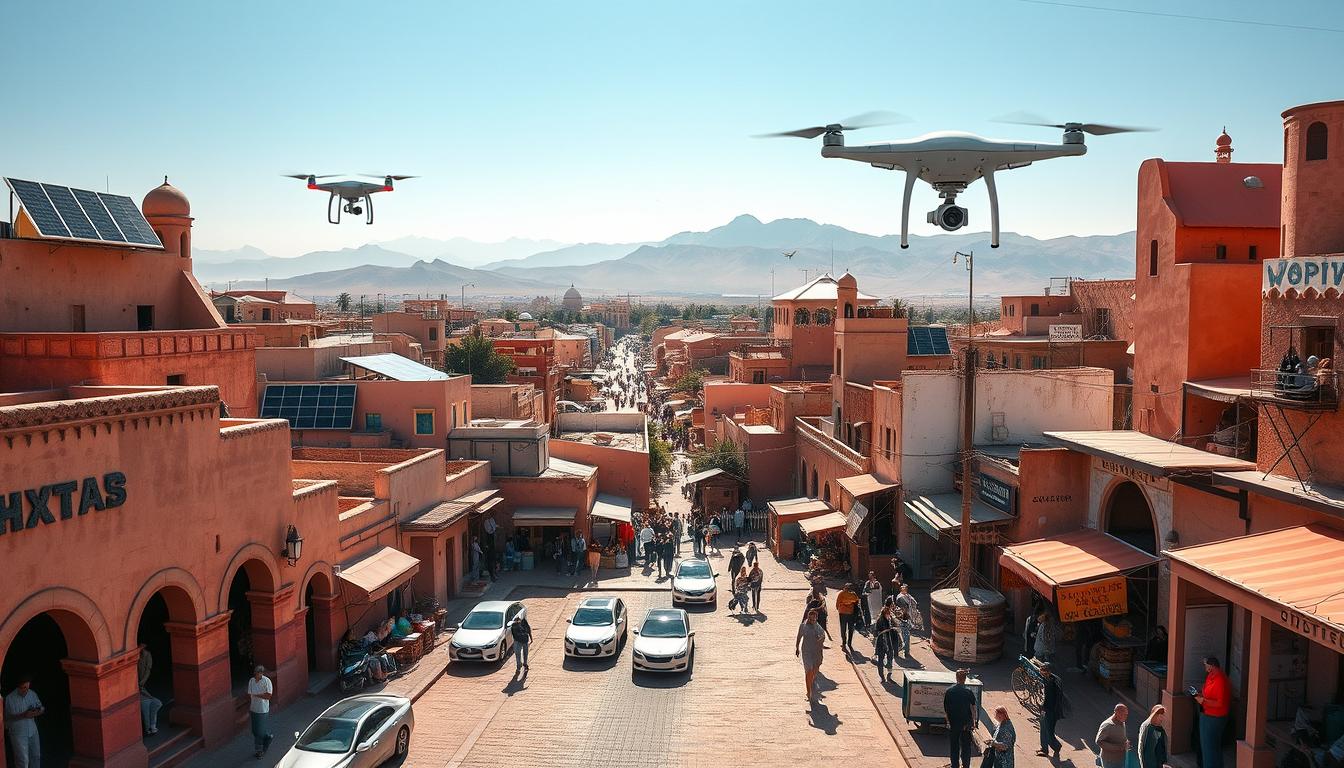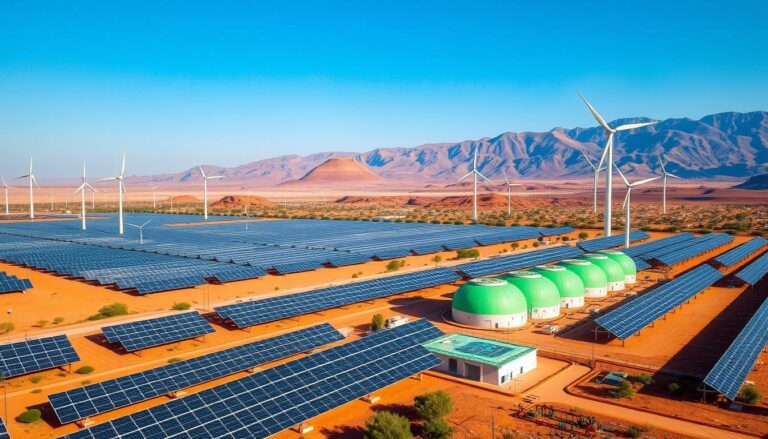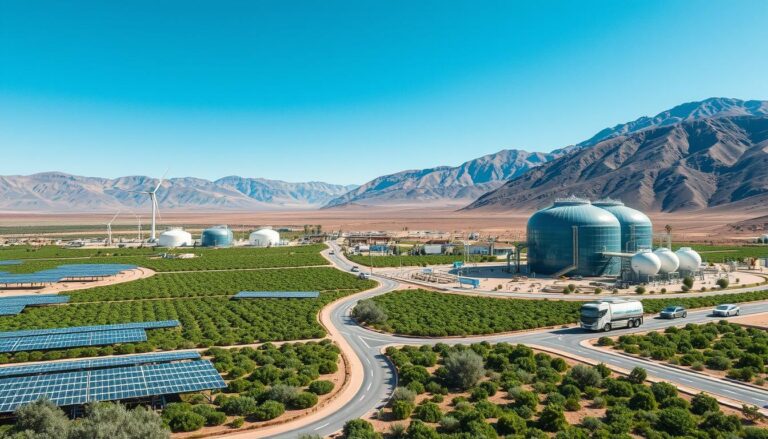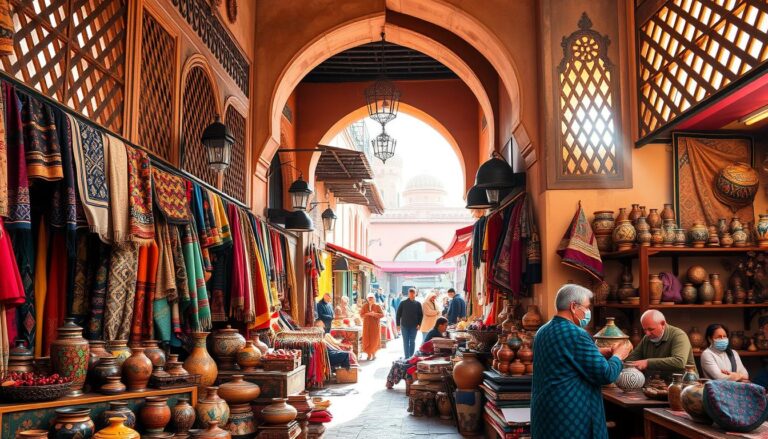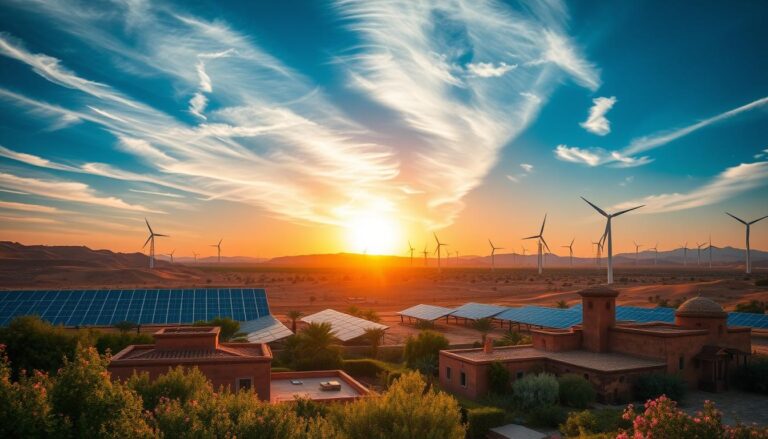Is Morocco set to become the next big tech hub? The country’s tech growth has been impressive. It has made big steps in digital transformation and IT development. From ancient universities to new tech scenes, Morocco’s journey is captivating.
Recently, government policies have helped a lot. They support scientific research and education. For example, Morocco spends about 5% of its GDP on education. This has improved literacy and school completion rates.
The Morocco Innovation Strategy is also ambitious. It aims to start 200 new companies and create 1,000 patents by 2014. These goals show Morocco’s aim to shine in the global tech world.
Research investment has soared. It went from US$620,000 in 2008 to US$8.5 million in 2009. This shows both government and business are pushing Morocco’s IT growth. It’s turning into a new innovation center.
The Rise of Tech Startups in Morocco
Morocco is seeing a big increase in tech startups. This is thanks to areas like fintech, digital health, and agritech. The support from incubators and accelerators, especially in Casablanca, is key. They help these startups grow by offering the resources and advice they need.
The innovation ecosystem Morocco has 74 active and planned support structures. These include incubators, accelerators, co-working spaces, and financing programs. TECHNOPARK has helped over 1,100 companies since 2001, mainly in ICT, green technology, and cultural industries. They aim to help other regions succeed like Casablanca.
Effective intellectual property (IP) protection is vital for Moroccan tech startups. It keeps their innovations safe, fights counterfeiting, boosts their value, and draws investors. Morocco helps entrepreneurs protect their IP through various programs.
Tips for startups:
1. Start early in protecting your ideas.
2. Collaborate with industrial property advisors.
3. Stay informed on legal changes.
Governments and companies know how important it is to support innovation. Companies like OCP are embracing open innovation and digitalization. Banks such as Attijariwafa Bank and BMCE Bank of Africa also promote innovation and entrepreneurship.
In 2019, Morocco ranked 74th in the Global Innovation Index. This considers things like patent filings and startup funding. Technopark’s success shows 86% of startups do well during incubation. They also have a 95% satisfaction rate among businesses. Plus, 35% of startups at Technopark sell their services worldwide, showing their global impact.
Government Policies Driving Technological Advancement
Morocco has made big steps in boosting tech innovation with smart government policies. These policies show Morocco’s commitment to updating its tech scene.
Historical Background and Reforms
Morocco’s tech reforms have a rich history. They were shaped by royal decrees, special committees, and long-term plans. A key reform was the National Charter for Education and Training.
This charter aimed to link scientific research with economic growth. The “decade of education” plan also focused on this goal. These efforts helped build a strong tech base in Morocco.
Significant National Programs
Many national programs have helped shape Morocco’s tech scene. The Inter-Ministerial Permanent Committee on Scientific Research and Technological Development is key. It helps drive innovation.
The National Centre for Scientific and Technical Research (CNRST) also plays a big role. It backs research and tech projects.
Key Tech Hubs and Innovation Centers
Morocco is serious about tech innovation. It has set up key tech hubs and innovation centers all over the country. These places help startups grow and are key for tech progress in the area.
Technopolis Rabat and Other Science Parks
Technopolis Rabat is a top tech park in Morocco. It’s a hub for high-tech industries and research. Other science parks, like the Emerging Business Factory in Marrakech, also help startups.
These parks offer coworking spaces, legal advice, and mentorship. They help young entrepreneurs and startups grow.
The Role of Universities in Tech Development
Universities in Morocco are also key in tech innovation. They help create new technologies and breakthroughs. Places like Mohammed VI Polytechnic University and the International University of Rabat are leaders in research.
They work with students, researchers, and industry experts. This leads to new inventions and tech growth.
Universities also partner with global organizations. For example, Google’s Launchpad Accelerator and Endeavor Morocco help startups. These partnerships give startups resources, mentorship, and funding. This makes Morocco a rising tech hub in North Africa.
Morocco’s Position in Global Innovation Index
Morocco has made big strides in the Global Innovation Index. It now ranks 66th, up from 70th in 2023. This shows how Morocco is getting better at tech and innovation.
Morocco shines in areas like intangible assets intensity rate. It’s also in the top 30 for education spending and high-tech manufacturing. This makes Morocco stand out globally.
Morocco does well in innovation results, ranking 47th worldwide. It uses its resources very efficiently to create new ideas. The country also ranks 31st in venture capital presence, showing it’s a good place for investments.
Morocco uses the global index as a benchmark for its innovation. It invests in research and development to keep improving. This helps Morocco move up in the Global Innovation Index.
Foreign direct investment (FDI) is key for Morocco’s innovation. In 2022, it got $2.1 billion in FDI, ranking fifth in Africa. This money goes into various sectors, boosting Morocco’s innovation and tech infrastructure.
Investment in Research and Development
Investment in R&D is key for Morocco’s growth. It focuses on science and technology, aiming to become a knowledge-based economy.
National Fund for R&D
The National Fund for Scientific Research and Technological Development was set up in 2001. It helps boost Morocco’s R&D efforts. The World Bank gave Morocco a US$300 million loan to support its plan for education and innovation.
This plan aims to train over 200,000 students in new skills. It also plans to enroll more than 4,000 PhD students in important fields. The goal is to make education better match the needs of the economy.
It also wants to improve how universities are run and help with international research. This shows Morocco’s strong commitment to R&D.
Private Sector Contributions
The private sector plays a big role in Morocco’s R&D. It works with universities to bring in more funding. This helps the government’s plan to improve universities with private help.
In recent years, the manufacturing sector got more foreign investment. This growth is thanks to R&D efforts. Morocco is focusing on areas like renewable energy and biomedicine to meet global needs.
These efforts help Morocco grow and create jobs in important fields. Private sector R&D is key to this success.
Emerging Trends in Digital Transformation
Morocco is leading the way in digital transformation, making big strides in telecom, fintech, and e-commerce. Entrepreneurs and the government are working together to modernize and grow the economy. This effort aims to make Morocco more competitive globally.
Morocco’s digital scene has improved a lot. The Digital Risers 2021 report by the European Center for Digital Competitiveness shows Morocco is 8th in digital competitiveness in North Africa and the Middle East. This shows the country’s strong commitment to using new technology in both public and private sectors.
The COVID-19 pandemic sped up Morocco’s digital change. It moved away from paper-based systems and started using teleworking in government. This change saved money, made things faster, and improved services for citizens.
The use of National Electronic Identity Cards is a big step forward for Morocco. Nine million people use these cards online. Also, over 80% of schools now have internet, up from 20% a decade ago. This shows Morocco’s effort to close the digital gap between cities and rural areas.
Morocco is also focusing on smart manufacturing and becoming a key player in Industry 4.0 in Africa. Startups are working on robotics and automation to make processes better in manufacturing and farming. The use of IoT devices is another trend, helping save water in irrigation.
In summary, Morocco’s digital transformation efforts are setting the stage for more progress and resilience in the digital world. This highlights the country’s strategic focus on innovation and modern technology.
Clean Energy Technology and Innovation
Morocco is focusing on clean energy and new technologies. It aims to make its energy use more efficient. This is part of its National Energy Strategy.
National Energy Strategy
Morocco’s National Energy Strategy is key to its future. It wants to use more renewable energy, aiming for 52% by 2030. The goal is to use less fossil fuels and more sustainable energy.
Big investments are going into solar, wind, and hydropower. These projects have clear goals and plans to help them succeed.
Key Renewable Projects and Investments
The Ouarzazate Solar Power Station (Noor) is a big deal. It’s one of the biggest solar plants in the world. It makes a lot of clean energy.
The National Institute for Solar Energy (IRESEN) is also important. It focuses on research and new ideas in renewable energy.
The Green Climate Innovation Program (GCIP) in Morocco started its second phase in October 2022. It works with local partners in four areas. Each area helps thirty green entrepreneurs.
These entrepreneurs get financial help for their projects. They work on energy efficiency, renewable energy, and more. This helps Morocco move forward in clean energy.
GCIP alumni have come up with many new ideas. They’ve made everything from AI for cities to eco-friendly baby products. Their work helps the environment and creates jobs.
Morocco could make 500 terawatt-hours of energy from wind and solar. This shows how much clean energy it can make. With more investment, Morocco could lead in clean energy.
Scientists, inventors, and experts from around the world are helping. They’re making Morocco a center for clean energy innovation.
Success Stories: Moroccan Tech Companies
Several successful Moroccan tech companies have made a big impact. They show Morocco’s ability to create competitive tech firms. These companies are leading the way in innovation.
Glovo is a top tech firm in Morocco. It started by adding popular restaurants to its platform without agreements. Despite challenges like a cash-based economy, Glovo used local marketing and tech to succeed.
Their app and logistics algorithms help them run smoothly in Moroccan cities. During the COVID-19 pandemic, Glovo offered contactless delivery. They also partnered with pharmacies and grocery stores, showing their commitment to the community.
In the automotive sector, Morocco has attracted big investments from Renault and Stellantis. In 2020, the sector made $8.1 billion in exports. Morocco aims to use 80% of automotive parts locally, aiming to be a big player in the global market.
The aerospace sector has also grown fast, with a 21.9% increase in exports. Morocco kept 90% of its aerospace jobs during tough times. This makes Morocco the 36th most attractive country for aerospace manufacturing.
Morocco is also focusing on clean energy. The Noor project is the world’s largest solar power plant. Solar and wind power make up 38% of Morocco’s energy, showing its commitment to renewable energy.
In the pharmaceutical industry, the SENSYO Pharmatech plant in Benslimane is expanding. It will produce 116 million vaccines annually by 2024. These projects show Morocco’s diverse tech advancements.
These success stories highlight Morocco’s achievements and encourage more tech growth. As Morocco continues to support its tech ecosystem, there’s hope for its companies to succeed globally.
Challenges Facing Technological Innovation in Morocco
The challenges in the Moroccan tech sector have been big hurdles to reaching full potential in tech innovation. Despite hard work, issues like infrastructure and funding problems keep getting in the way.
Infrastructure Limitations
One big tech infrastructure limitation in Morocco is the lack of fast internet in rural areas. Cities like Casablanca and Rabat are getting better, but rural areas are still behind. This makes it hard for tech startups and companies to grow everywhere.
Also, the effort to digitize land records and processes has hit big roadblocks. This has slowed down the digital change process, as seen by the Agence Nationale de la Conservation Foncière du Cadastre et de la Cartographie (ANCFCC).
Funding and Investment Hurdles
Getting money is a big problem for many startups in Morocco. This is because local investors are cautious and the rules are strict. Efforts like E-Morocco 2005-2008, Maroc Numeric 2013, and the Maroc Digital 2020 Plan have helped a bit.
But, Morocco needs a stronger financial system to keep innovation going. Public groups, which depend a lot on government money, often don’t have enough funds. This stops them from working on long-term digital projects.
Conclusion
Morocco is on the verge of a tech revolution. This is thanks to government plans, private sector help, and global partnerships. The “Digital Morocco 2025” plan shows the country’s commitment to digital growth. It aims to boost digital progress in many fields.
Places like Casablanca Technopark and Rabat Technopolis are key to this growth. They focus on IT, green tech, and biotech. These areas are crucial for Morocco’s future.
Government policies are key to Morocco’s tech growth. The goal is to get 52 percent of energy from clean sources by 2030. This shows Morocco’s commitment to green energy.
The Mohammed VI Tangier Tech City is a symbol of Morocco’s tech ambitions. It aims to be a top tech and industrial center. This is made possible by teamwork between the government, private sector, and global partners.
Despite progress, challenges still exist. Expanding internet access in rural areas is a big one. Solving these problems is crucial for Morocco’s tech future.
The outlook for tech in Morocco is bright. It has a supportive ecosystem for startups and entrepreneurs. With ongoing investment in research, Morocco is becoming a tech leader in Africa.
Source Links
- Science and technology in Morocco
- Morocco, one of the world’s most competitive countries in new technologies
- The Rise of Tech Startups in Morocco: Why a Strong Intellectual Property Strategy is Essential? – H&H IP LAW
- Supporting start-ups Episode 3 – How is the Moroccan innovation ecosystem being built? – Accuracy
- Technopark Morocco: Empowering Startups to Innovate
- Plans and priorities – Mission Innovation
- Morocco: The Impact of the Digitization of Public Services
- How Morocco Has Become A Thriving Creative Hub For Digital Nomads
- Morocco: The Next Industrial and Technological Hub 🇲🇦🇪🇺🇺🇸🇬🇧
- GII 2024: Morocco Ranks 1st in Industrial Design, a Success Due in Part to its Unique Intangible Capital (WIPO Chief)
- Morocco – United States Department of State
- Morocco Drives Transformative Impact for Higher Education and Scientific Research with World Bank Support
- Morocco’s Long Road Toward Economic Transformation
- Digital Transformation in Morocco
- 📱 Morocco’s Digital Revolution: From Ancient Medinas to Smart Cities 🚀
- Morocco
- Morocco: New Prospects for Clean Energy Development
- Climate Resilience for Energy Transition in Morocco – Analysis – IEA
- Morocco turns to hi-tech manufacturing
- Glovo’s Moroccan Success: Innovating in Emerging Markets • BEWILDERED IN MOROCCO
- Morocco’s Innovation Ecosystem: Breaking Silos, Building Collaboration – Startup Nation Central
- No title found
- Morocco: Maximizing Economic Momentum and IP Innovation – SABA IP – Intellectual Property in the Middle East and Africa
- The Impact of Technological Innovation on Employment: The Case of Morocco

The Editorial Team is a passionate group of Morocco enthusiasts dedicated to sharing the beauty, culture, and wonders of this captivating country. With diverse backgrounds and a deep love for travel, we strive to bring you engaging and informative content that inspires your Moroccan adventures. From uncovering hidden gems and sharing local insights to exploring mouthwatering cuisine and showcasing the vibrant lifestyle, our team is committed to providing you with valuable resources and exciting stories that enhance your exploration of Morocco. Join us on this journey as we celebrate the rich heritage and unforgettable experiences that make Morocco truly special.

